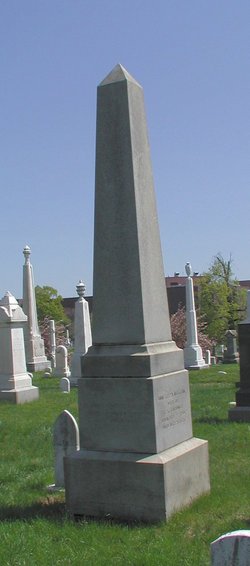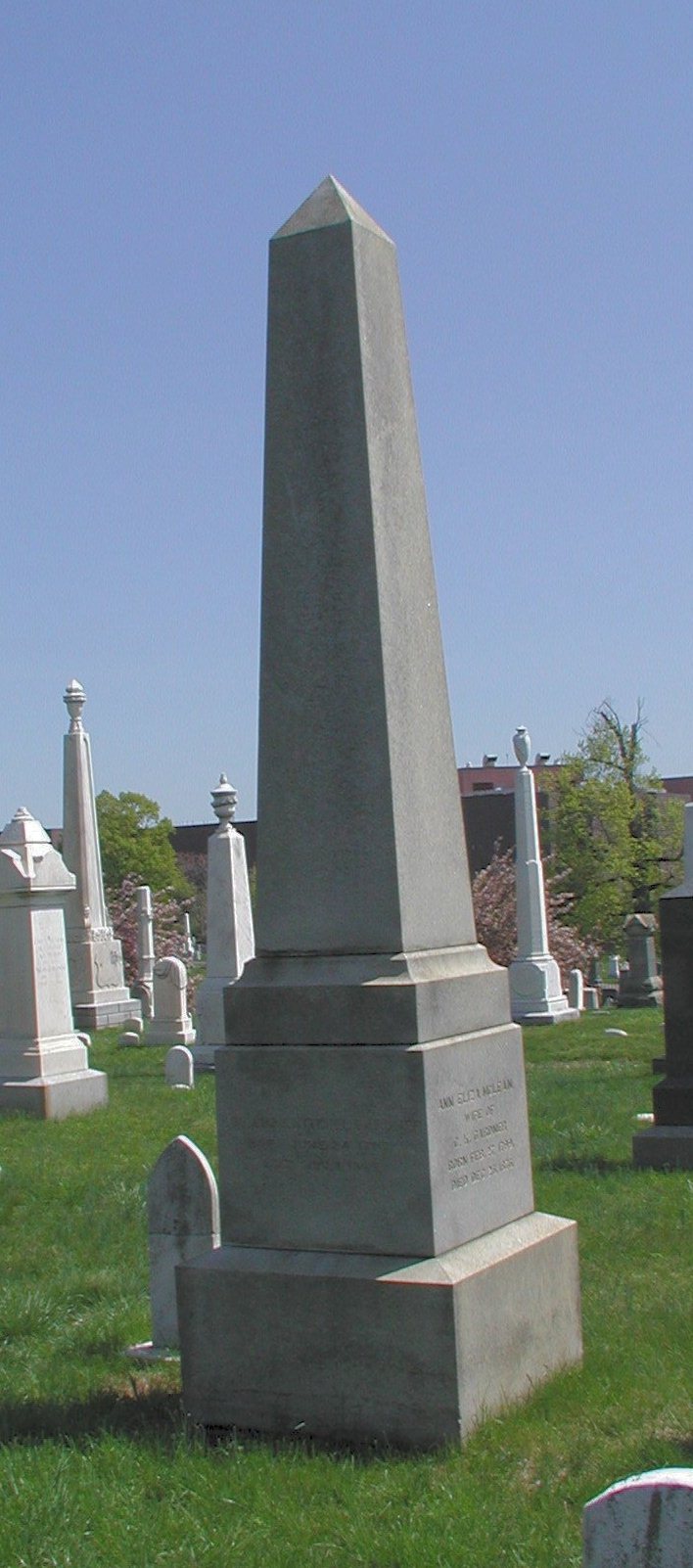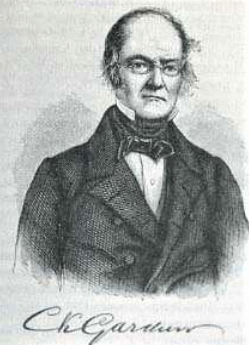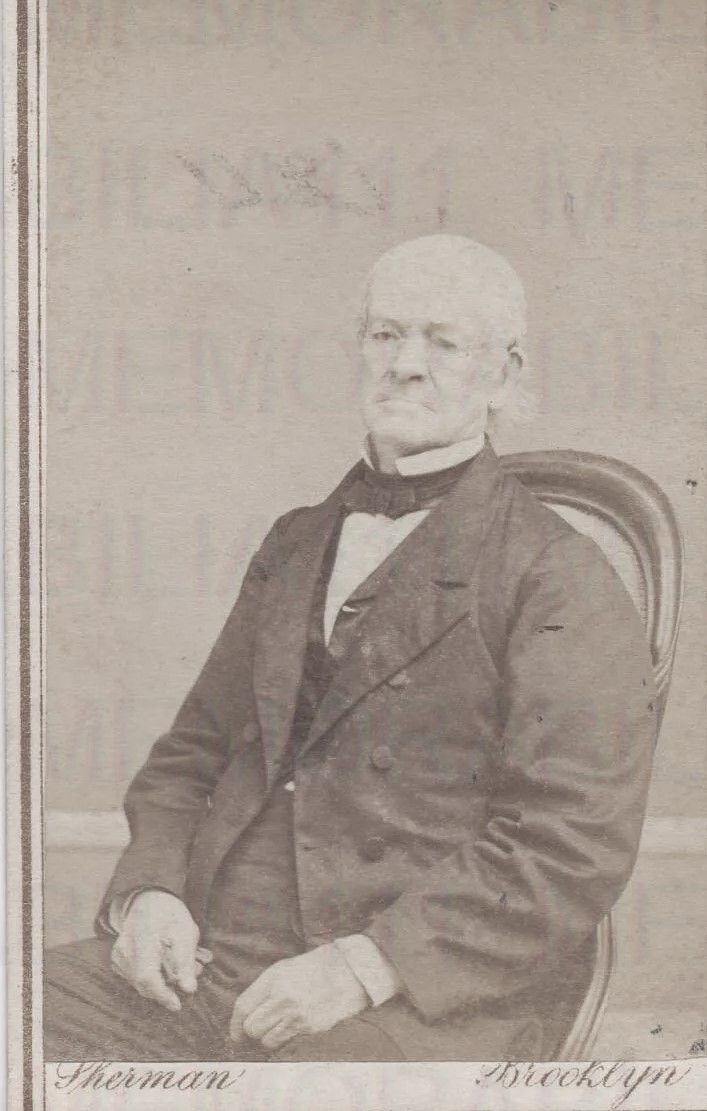buried November 3, 1869.
Obituary provided by LBN (# 49278253).
Published in the Dictionary of American Biography - Gardner, Charles Kitchell, soldier, was born in Morris county, N.J., in 1787. In May, 1808, he joined the U.S. army as ensign in the 6th infantry, was promoted adjutant, May, 1809; 2d lieutenant, June, 1809, 1st lieutenant, March 1811, and served as brigade inspector to General Hampton from April 1811. He was promoted captain of the 3d artillery in July, 1812; brigade-major on the staff of General Armstrong, Aug. 4, 1812; adjutant-general, March 18, 1813, and transferred to the 23d infantry. In the war of 1812 he took part in the battles of Chrysler's Field, Chippewa, and Niagara, and in the siege and defense of Fort Erie. He was promoted lieutenant-colonel for distinguished and meritorious services, Feb. 5, 1815, and in May, 1816, was made adjutant-general of the division of the north. He resigned his commission, March 17, 1818. He was the first assistant postmaster-general, 1829-37; auditor of the post-office department, 1837-41; commissioner to settle affairs in connection with the Indians in the Southern states, 1841-45; postmaster of Washington, D.C., 1845-49; surveyor-general of Oregon, 1853-57, and clerk of the U.S. treasury department, 1857-67. He published: A Compendium of Military Tactics (1819); A Dictionary of Commissioned Officers who have served in the Army of the United States from 1789 to 1853 (1853); and A Permanent Designation of Companies and Company Books, by the First Letters of the Alphabet. He died in Washington, D.C., Nov. 1, 1869.
--------------------
Published in The Evening Star, November 4, 1869 - The Funeral of Colonel Gardner
The funeral of the late Charles K. Gardner, for a long series of years a resident of this District was attended from his late residence on New Jersey Avenue south of the Capitol by a very large concourse of friends at noon today.
The beautiful burial service of the Episcopal Church was read by Rev. A.F. Steele, of St. Mark's Memorial Chapel after which the remains, encased in a handsome walnut coffin, rosewood finish were borne to the hearse (Messrs. J.H. Houston, D.W. Middleton, B.B. French, J. Carroll Brent, James Adams and Charles Sherman being the pall bearers) and the cortege being formed by Mr. R.W. Barker,
the undertaker, proceeded to the Congressional Cemetery where they were interred.
There were a large number of his old associates in the public service present, as also many of the "Oldest Inhabitants" and as the cortege left the residence the bell of Columbia Engine Company -- of which company he was many years ago President -- was tolled in respect to his memory and the flag placed at half mast.
also...."A lifelong Democrat, Charles was born in New Jersey, educated in New York at Columbia University in Medicine, and joined the military as an ensign in 1808. He served in various line and staff positions through the War of 1812, leaving the military in 1818 as a Colonel at the request of his fiancé. In 1815 he was court martialed by General Eleazar Ripley, with whom Charles had a personal quarrel.
"He was found guilty of only showing disrespect to a superior, but not cowardice or neglect of duty, and he was restored to rank. While in the Army, he is credited with coming up with the system of naming companies in regiments by letters of the alphabet. After his military service, Charles went to New York where he first succeeded his father-in-law as Commissary General of New York, and then edited or published at least two magazines, The New York Patriot, a political publication, and The Literary and Scientific Repository, loosely affiliated with James Fennimore Cooper.
"He started as a Clerk with the Post Office Dept. in 1822, became Assistant Postmaster General in 1829-1837, Auditor for the Post Office in the Treasury Department in 1837-41, and Postmaster of Washington, D. C. 1845-49. He was a friend of Franklin Pierce, and Pierce named him Surveyor General of Oregon at age 66 in 1853, arriving on November 1, 1853 with his sons and serving until 1856. He moved the office of Oregon Surveyor General from Oregon City to Salem in 1854. Hissons, George Clinton and Charles T. came to Oregon with him and worked as chainmen, compass men, and U. S. Deputy Surveyors as long as Charles was in office. He served two years, and then received a job in the Treasury Department, which he held until two years before his death.
"Gardner was the author of: "Compend of Military Tactics", and "Dictionary of the Army." His daughter, Emma, married the future Governor of Louisiana, Senator Alexandre Mouton. Franklin, one of his sons and a West Point Graduate, married the step-daughter of Emma and became a Major General in the Confederacy. Another son, Charles, became Assistant Adj. General for General Parke in the Union Army. George was an astronomer on both the Mexican and Canadian Boundary Surveys before becoming an engineer and executive for railroads. Charles K. died in Washington, D.C. His papers are located at the New York State Library. This is the maintained version of the information. Courtesy: USGS.
buried November 3, 1869.
Obituary provided by LBN (# 49278253).
Published in the Dictionary of American Biography - Gardner, Charles Kitchell, soldier, was born in Morris county, N.J., in 1787. In May, 1808, he joined the U.S. army as ensign in the 6th infantry, was promoted adjutant, May, 1809; 2d lieutenant, June, 1809, 1st lieutenant, March 1811, and served as brigade inspector to General Hampton from April 1811. He was promoted captain of the 3d artillery in July, 1812; brigade-major on the staff of General Armstrong, Aug. 4, 1812; adjutant-general, March 18, 1813, and transferred to the 23d infantry. In the war of 1812 he took part in the battles of Chrysler's Field, Chippewa, and Niagara, and in the siege and defense of Fort Erie. He was promoted lieutenant-colonel for distinguished and meritorious services, Feb. 5, 1815, and in May, 1816, was made adjutant-general of the division of the north. He resigned his commission, March 17, 1818. He was the first assistant postmaster-general, 1829-37; auditor of the post-office department, 1837-41; commissioner to settle affairs in connection with the Indians in the Southern states, 1841-45; postmaster of Washington, D.C., 1845-49; surveyor-general of Oregon, 1853-57, and clerk of the U.S. treasury department, 1857-67. He published: A Compendium of Military Tactics (1819); A Dictionary of Commissioned Officers who have served in the Army of the United States from 1789 to 1853 (1853); and A Permanent Designation of Companies and Company Books, by the First Letters of the Alphabet. He died in Washington, D.C., Nov. 1, 1869.
--------------------
Published in The Evening Star, November 4, 1869 - The Funeral of Colonel Gardner
The funeral of the late Charles K. Gardner, for a long series of years a resident of this District was attended from his late residence on New Jersey Avenue south of the Capitol by a very large concourse of friends at noon today.
The beautiful burial service of the Episcopal Church was read by Rev. A.F. Steele, of St. Mark's Memorial Chapel after which the remains, encased in a handsome walnut coffin, rosewood finish were borne to the hearse (Messrs. J.H. Houston, D.W. Middleton, B.B. French, J. Carroll Brent, James Adams and Charles Sherman being the pall bearers) and the cortege being formed by Mr. R.W. Barker,
the undertaker, proceeded to the Congressional Cemetery where they were interred.
There were a large number of his old associates in the public service present, as also many of the "Oldest Inhabitants" and as the cortege left the residence the bell of Columbia Engine Company -- of which company he was many years ago President -- was tolled in respect to his memory and the flag placed at half mast.
also...."A lifelong Democrat, Charles was born in New Jersey, educated in New York at Columbia University in Medicine, and joined the military as an ensign in 1808. He served in various line and staff positions through the War of 1812, leaving the military in 1818 as a Colonel at the request of his fiancé. In 1815 he was court martialed by General Eleazar Ripley, with whom Charles had a personal quarrel.
"He was found guilty of only showing disrespect to a superior, but not cowardice or neglect of duty, and he was restored to rank. While in the Army, he is credited with coming up with the system of naming companies in regiments by letters of the alphabet. After his military service, Charles went to New York where he first succeeded his father-in-law as Commissary General of New York, and then edited or published at least two magazines, The New York Patriot, a political publication, and The Literary and Scientific Repository, loosely affiliated with James Fennimore Cooper.
"He started as a Clerk with the Post Office Dept. in 1822, became Assistant Postmaster General in 1829-1837, Auditor for the Post Office in the Treasury Department in 1837-41, and Postmaster of Washington, D. C. 1845-49. He was a friend of Franklin Pierce, and Pierce named him Surveyor General of Oregon at age 66 in 1853, arriving on November 1, 1853 with his sons and serving until 1856. He moved the office of Oregon Surveyor General from Oregon City to Salem in 1854. Hissons, George Clinton and Charles T. came to Oregon with him and worked as chainmen, compass men, and U. S. Deputy Surveyors as long as Charles was in office. He served two years, and then received a job in the Treasury Department, which he held until two years before his death.
"Gardner was the author of: "Compend of Military Tactics", and "Dictionary of the Army." His daughter, Emma, married the future Governor of Louisiana, Senator Alexandre Mouton. Franklin, one of his sons and a West Point Graduate, married the step-daughter of Emma and became a Major General in the Confederacy. Another son, Charles, became Assistant Adj. General for General Parke in the Union Army. George was an astronomer on both the Mexican and Canadian Boundary Surveys before becoming an engineer and executive for railroads. Charles K. died in Washington, D.C. His papers are located at the New York State Library. This is the maintained version of the information. Courtesy: USGS.
Family Members
Advertisement
Advertisement


















